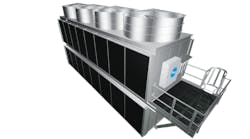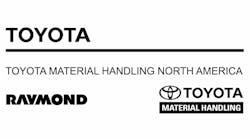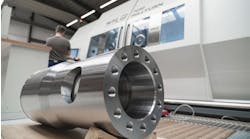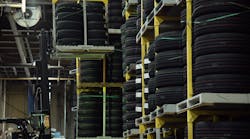Continental Tire’s expansive Mt. Vernon, Ill.-based production operation occupies a 60-acre facility and employs a workforce of over 3,000. It primarily serves the North American market, manufacturing a full line of commercial and passenger tires. Nearly 20 years ago, the Mt. Vernon operation began working with forklift dealer Black Equipment (a Yale dealer) for lift trucks and fleet service.
In 2003, the relationship deepened when Continental Tire tapped Black Equipment as the exclusive lift truck provider for its Mt. Vernon facility and outsourced all lift truck fleet maintenance to the dealer’s team of technicians—all trained and certified. That maintenance arrangement continues to this day, closely monitoring a large fleet of equipment.
CHALLENGE
Continental Tire needed a technology-based solution to provide greater lift truck fleet visibility and drive process optimization. The telemetry solution needed to address four key areas.
1. OSHA compliance: Replace paper checklists for OSHA-mandated daily inspections with electronic alternatives, and save more than 279,000 pieces of paper per year.
2. Operator monitoring: Match equipment reports with operators to gauge performance and automate reporting.
3. Preventive maintenance: Schedule maintenance based on real-time data, rather than predetermined guidelines, helping create a leaner, more efficient operation with minimal unplanned downtime.
4. Equipment utilization: Automatically track lift truck utilization across the facility’s different departments to determine appropriate equipment needs.
SOLUTION
A telemetry solution allowed Continental Tire to leverage its existing relationship with Black Equipment. The solution works with any type of mobile warehouse equipment, including the tire manufacturer’s lift truck fleet as well as tuggers.
The scale of the Mt. Vernon facility’s 24-hour, three-shift operation requires a massive workforce that exceeds the telemetry system’s default 1,034 operator capacity. To accommodate this volume, Nathan Baugher, fleet and rolling stock manager for Continental Tire, worked with the telemetry system team to produce a custom, dedicated matrix. This provided the necessary capacity to keep track of all the operators, while maintaining the functionality and performance of the telemetry portal.
The solution can operate on wi-fi and cellular networks, including both Global System for Mobiles (GSM) and Code Division Multiple Access (CDMA). The need to avoid reliance on internal IT resources ruled out wi-fi, and the location’s lack of GSM cellular coverage meant that Continental Tire required CDMA modules.
The final piece was getting the facility’s different departments up to speed on how to use the solution. This included training management on basic utilization reporting and equipment monitoring, and building operator knowledge.
“Because the system is web based, getting everyone access was very easy. We didn’t have to install any client-side software to the PCs. They can literally access the system anywhere, as long as they have Internet access,” says Baugher. “And the active filtering makes looking for specific operators or vehicles easy to do.”
IMPACT
With the system up and running, Continental Tire started to reap the benefits of a more efficient, visible lift truck fleet. The web portal and automated functions ushered in a leaner, more efficient era, with optimized maintenance, OSHA compliance, equipment utilization and performance monitoring.
Automated Service Calls and Preventive Maintenance Decrease Downtime
Continental Tire’s telemetry system includes fault code monitoring, in which the system sends an automatic alert for proactive service based on real-time equipment status. These alerts go directly to Black Equipment, who dispatches a technician without burdening Continental Tire’s operators or management.
These alerts can prevent minor issues, such as a loss of hydraulic pressure or slight controller damage, from escalating into crippling downtime. The telemetry solution also chronicles usage data and equipment wear, and provides a list of parts to address any issues and offer a faster resolution. This made Black Equipment’s maintenance even more efficient and effective, with more precise scheduling and better first-pass completion.
Controlled Spending through Truck Utilization Data
No operation can afford unplanned downtime, and Continental Tire is no different. But this aversion to downtime can take a wasteful turn, with many operations purchasing unnecessary trucks as a budget-busting buffer against downtime risk. A telemetry system can help avoid these purchases, lease overruns and service by analyzing utilization trends like key time, motion, idle time and more.
As the Mt. Vernon facility implemented new processes and expanded production, analysis of information from the telemetry system proved that Continental Tire did not require any corresponding lift truck fleet expansion. This prevented unnecessary capital expenditures and provided data-driven confidence that the existing fleet was sufficient.
“With the utilization information the telemetry system provides, we were able to prove that new process workloads could be absorbed using our existing fleet,” Baugher says.
In Continental Tire’s three-shift, 24-hour rotation, properly allocating lift trucks means no unit can be used in back-to-back shifts. To enable this strategy, the telemetry system provides truck-specific utilization data complete with shift time reporting, and maintains access protocols to ensure operators have the equipment they need.
IMPROVED SAFETY AND COMPLIANCE
The telemetry system provides digital checklists incorporated into the interlock of each vehicle. These checklists prompt operators to perform mandatory equipment checks before each shift. This feature ended Continental Tire’s reliance on inefficient, outdated paper checklists, delivering significant savings in paper and clerical costs.
Ultimately, close collaboration between Continental Tire and its forklift and technology partners proved critical to the success of the project. The company now completes 225,000 digital checklists annually, saving 279,000 sheets of paper and saving $120,000 in paper and clerical costs.
“Given the sheer size of the operation, it’s important to have champions on both sides so you don’t wind up overwhelmed by more information than you know what to do with,” says Scott Bonnell, president, Black Equipment. “Continental Tire set up the parameters they need for their operation, and the telemetry solution provides that custom level of awareness integral to the success of the Mt. Vernon facility.”
Kevin Paramore is emerging technology commercialization manager with forklift manufacturer Yale Materials Handling Corp.











